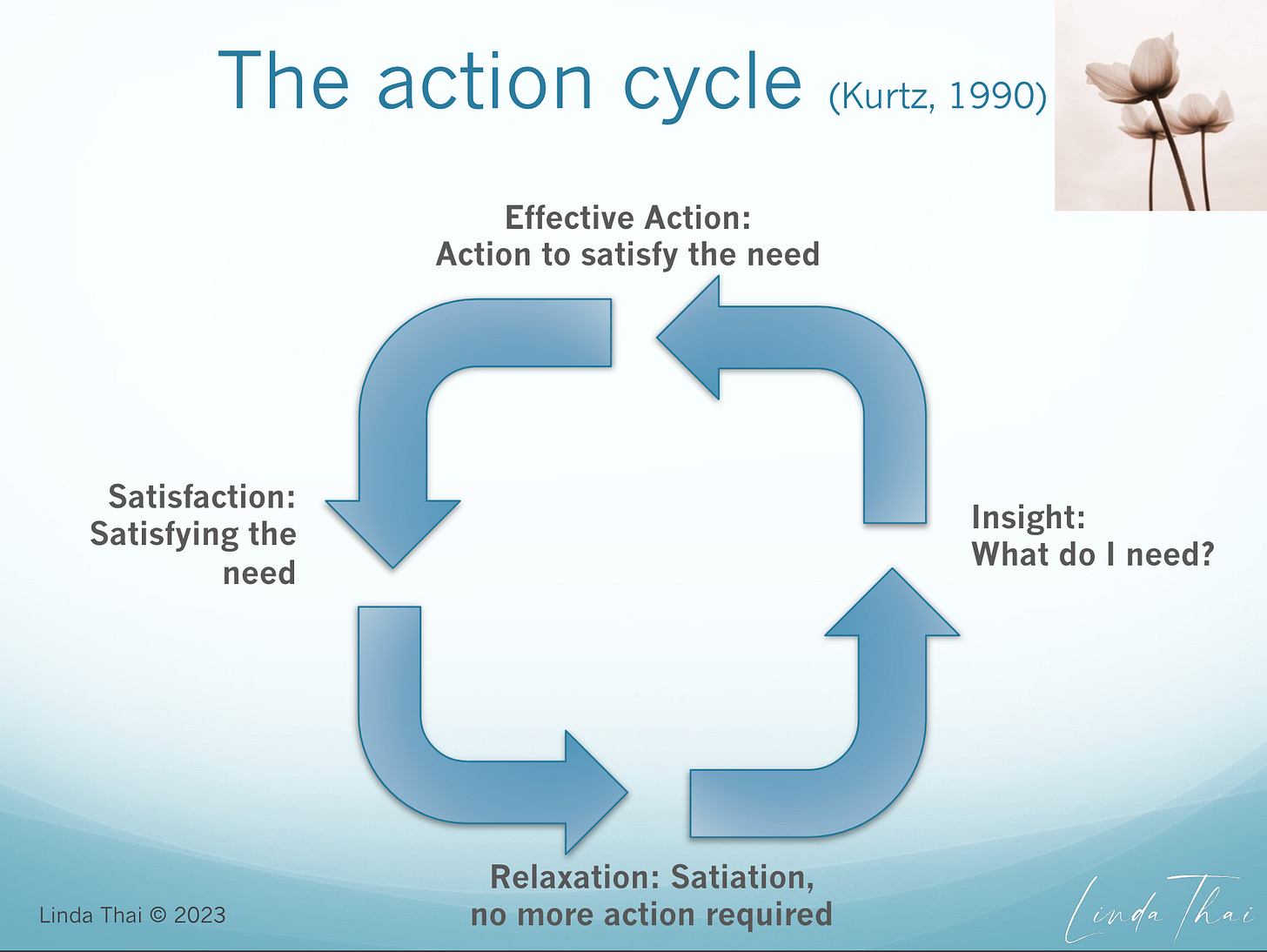You Have Permission to Rest
I’ve started off my podcast, Who We Are & What We Need, with an invitation to rest. One of the things we are desperately in need of in our culture is permission and space to rest. Breathing room, down time, spaciousness, and rejuvenation, inside and out. We are so tired. Tired of pushing, tired of trying, tired of trying to convince ourselves to keep going. Tired of our internal taskmasters that are burdened by the impossible task to always be productive. These taskmaster parts of us won’t let us rest because they are afraid we will no longer feel worthy, that we will fall behind, we will be seen as lazy or irresponsible, or we will lose our financial security. These are real fears baked into our system of capitalism, meritocracy, and endless action.
The Action Cycle
I learned about The Action Cycle in an amazing training I had with Linda Thai. It is a needs-honoring cycle. Notice how it starts with our needs, rather than with outside demands. This is how the inner physics of our human nature is intended to work. It is not hustle culture. It is not unceasing demands and frantic actions. It doesn’t start with outside demands at all. It starts with interoception and insight - noticing what you need, giving yourself permission to fulfill that need, finding the information you need, having enough agency in your life to fulfill that need, satisfying that need, and enjoying that satisfaction. Satisfaction, nourishment, and enoughness are an integral part of rest.
Our bodies were not made to keep going. Even the Energizer Bunny can’t keep going. He has to get a new battery. We don’t have new batteries. We just have one body. And we desperately need permission to listen to our bodies’ call for rest, pause, down time, space, and satisfaction. If we are satisfied that we have done enough, we can celebrate that and pause and rest.
Our bodies were intended to be enjoyed, lived in, cared for, listened to, and appreciated. They were not made to be managed, coerced, controlled, tamed, or embattled. We can have a relationship with our bodies instead of living out of our heads and trying to control them. We can begin to learn our bodies’ cues and what they mean. We learned how to recognize when we’re hungry, thirsty, and need to go to the bathroom. Why can’t we learn to recognize, and not override, when we’re tired, burned out, listless, restless, unfocused, spaced out or sleepy? Can we more often give our bodies at least a little of what they are crying out for rather than berating them for not having more stamina? Can we have compassion for our (bodies’) needs and respect for our (bodies’) limitations? Can we treat them like our friend rather than a machine? Can we honor our humanity and live in the satisfying domain of rest and real-ness instead of demanding perfection and production from ourselves at every moment?
Learning Self-Trust and Self-Care
When we begin to listen and honor our bodies’ needs, be begin to build internal trust and friendship. Our bodies feel relieved that we are on their team instead of treating them like a lazy, incompetent employee. Our bodies have a voice and agency. They don’t have to “speak” so loudly to get our attention. They don’t have to shut down, act out, or go on strike. They don’t have to collapse in helplessness and frustration. They don’t have to fight us to get our attention. In short, we are working with them instead of putting them in survival or trauma mode. Which means, our bodies don’t have to go into fight/flight/freeze/fawn/collapse in response to the demands we experience. Because we get to work together to meet our bodies’ needs while also strategically addressing the external demands.
Rest is Connection
A large part of how we do this is rest. Rest is connection to ourselves. Space for our full selves to breathe. Rest satiates and brings a sense of enoughness. We can be aware of the resistance we feel to pleasure, rest, and feeling satisfied. And that becomes a need for the Action Cycle - the nourishment barrier, as Linda Thai refers to it. We can slowly explore what it’s like to nourish and care for ourselves. Maybe we won’t need to impulsively spend money on a luxury item to do that if we have space and permission to do that mindfully. Really being present and enjoying a bath, an afternoon at the beach, hiking, sitting in a rocking chair, dancing to your favorite song. These are all rest. And possibly way more satisfying. Because you are present and allowing yourself to accept the care you are giving yourself. Rest might also look like taking personal growth off of a to-do list, and focusing on just being present and noticing. It might look like saying no to most responsibilities and commitments for a while. It might look like decreasing your emphasis on the outcome and valuing the journey.
You can read about different types of rest in my article “How to Get the Rest You Desperately Need.”
Join the Rest Revolution at Trisha Hersey’s Nap Ministry.
Additional Resources:
Rest is Resistance by Trisha Hersey
When the Body Says No by Gabor Maté
Your Body is a Revolution by Tara Teng
The Wisdom of Your Body by Hillary L. McBride, PhD


